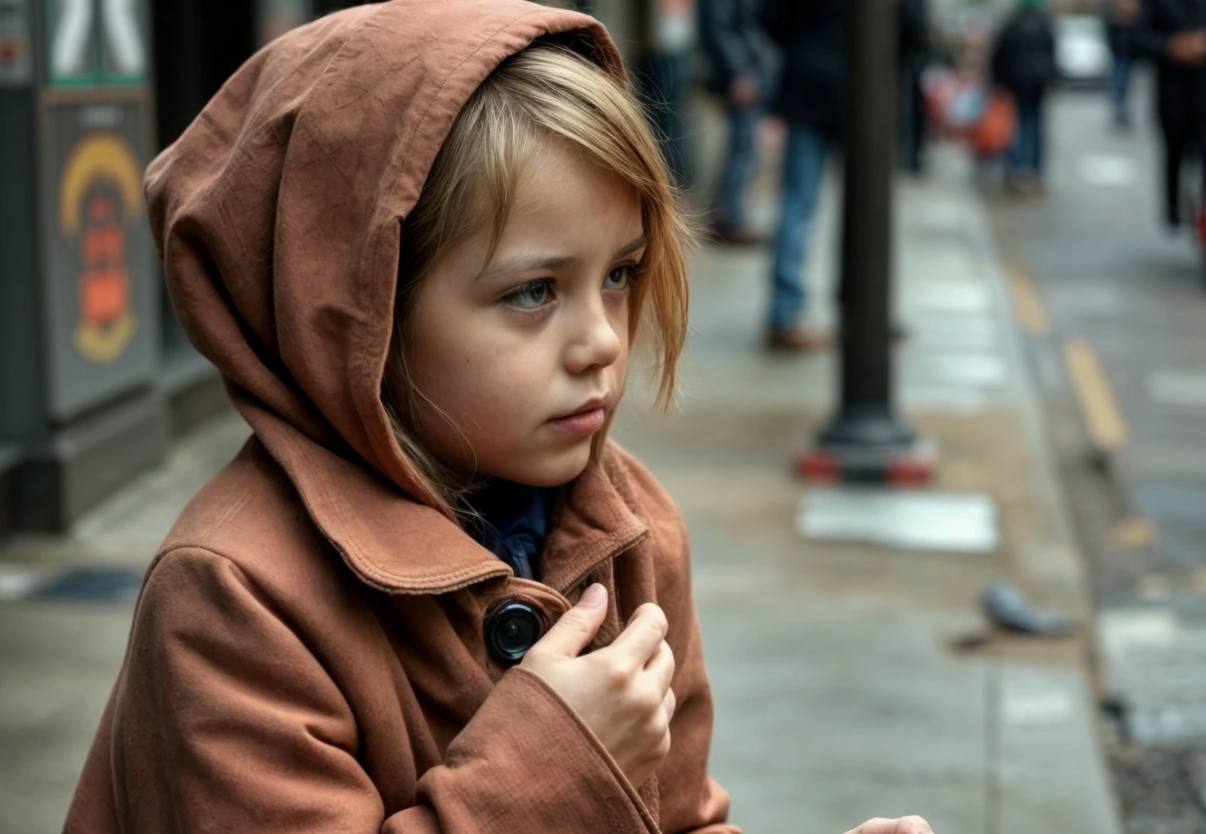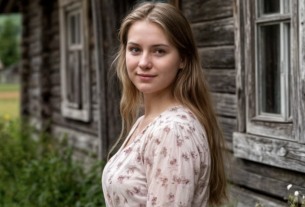“Son!” Vera Antonovna exclaimed, suddenly freezing at the doorway of her apartment. Her eyes widened with amazement and joy, her hands rose like birds ready to take flight. She rushed to her son, who had just come in, leaving the door slightly ajar, as if unable to believe her own eyes. “You really scared me! Why didn’t you say anything? I thought you still had six whole months behind bars! And the lawyer kept silent like a partisan!”
The mother couldn’t help herself — she cupped his face with her palms, stroked his hair, cheeks, shoulders, as if checking if he was real, alive, or just a nightmare again. His body was thin, angular, as if years of imprisonment had drained his strength and youth. But his gaze… his gaze remained the same — clear, direct, manly.
“Ilyushenka, my dear heart… What a happiness this is!” she sobbed, her voice trembling, overflowing with emotions long pent up.
“Mom, come on now,” Ilya tried to calm her, hugging her tightly and kissing her tear-wet cheek. “It’s all behind me now. I’m home. And about the lawyer… I asked him to keep quiet. I wanted to surprise you.”
“Oh, you’re such a rascal,” Vera Antonovna shook her head but already began bustling around. “We need to feed you, warm you up, so you forget what it’s like to eat from an aluminum bowl under the strict eye of a guard.”
She tried to slip away to the kitchen, but Ilya gently but firmly stopped her, standing between her and the door.
“Wait, Mom. You’re not saying something right. You want to hide something. What happened?”
Vera Antonovna lowered her eyes, and in that movement lay so many unspoken words that Ilya immediately understood — the news was bad.
“Your Lera…” she whispered, as if saying her name was more painful than speaking the truth. “She left as soon as you went behind bars. That’s what she’s like…”
Her guilty look, shortness of breath, whole posture — all said a lot. But Ilya had long known the answer. He had never seen her at visits, never received a letter, never a call. She disappeared without a trace.
“Yes, I expected that,” he smiled bitterly. “She never visited even once. God judge her.”
“True,” Vera Antonovna agreed briefly and, to distract herself from sad thoughts, headed to the kitchen. “I’ll try to cook something tasty.”
“Mom,” Ilya called her back, hugging her again. “But first, I want to go to the bathroom. I dreamed about it for all those one and a half years. I want to relax, cleanse myself, forget the smell of that prison soap.”
“Of course, son, go ahead,” she nodded, wiping tears. “I even bought foam with cedar oil, as if I knew you’d come back today.”
Lying in the warm water, Ilya closed his eyes and slowly sank into memories. The scent of cedar tickled his nostrils, foam bubbles played on his skin like old kisses from a beloved woman. He and Lera married when she was only twenty-two, but it seemed she had seen more in life than most people do in a lifetime. Smart, composed, with a piercing gaze and a cold smile, she was a mystery he never solved.
After the wedding, they settled in his home — a three-room apartment where one room belonged to his mother, another to them, the newlyweds. Ilya promised he’d soon start working, earn money, and they’d move out. But time passed, and circumstances increasingly worked against them.
On their third wedding anniversary, they decided to celebrate modestly, but everything went wrong. Lera drank a little too much; someone suggested seeing off a friend, and she, laughing, pulled Ilya along.
“Let’s go, Ilyusha, have some fun!” her cheerful tone rang, but that evening the air was heavy, as if sensing impending trouble.
Ilya agreed, though a feeling of unease arose inside him. Even his usually reserved mother warned him:
“Son, maybe it’s not a good idea? My heart isn’t at peace.”
“Oh, Mom, we’ll be quick,” he waved her off, unaware that this night would change everything.
Outside it was dark, summer was turning to autumn, and drunken groups staggered along the sidewalks. Some shouted, laughed; others hurried home. Lera, drunk, accidentally bumped into a group of guys, shouting something sharp and offensive.
“Get lost, you freak!” she yelled back at a challenging glance.
“You’ll answer for your words!” one of the guys shouted and, ignoring Ilya, grabbed Lera.
Ilya reacted instantly. He grabbed Lera’s hand and then struck the one who dared touch her. The guy fell as if cut down. Someone ran to him, another called an ambulance. But he couldn’t be saved — the pathologists determined the cause of death was an aneurysm that could burst even from a sneeze.
But the deceased’s family was influential. Ilya was sentenced — for exceeding self-defense limits and involuntary manslaughter. Vera Antonovna, though connected, could do nothing. The judge decided to punish him moderately so others wouldn’t get ideas.
“Ilyusha, you didn’t drown there, did you?” his mother’s voice called through the bathroom door.
“No, Mom, I’m coming out now,” he replied, turning on hot water to warm himself again.
At the table awaited a real treat — stewed cabbage, homemade buckwheat, pickled cucumbers, fish pie. Everything smelled familiar, homely, so necessary after long months of monotonous food.
“Smells delicious!” Ilya closed his eyes, inhaling the aroma. “I’ve missed this so much!”
“Eat, eat,” smiled Vera Antonovna. “I’ll run to the store — we’re out of bread, and I need to buy eggs for tomorrow. You like omelets, right?”
With his mouth full, Ilya happily nodded and laughed.
The store was literally around the corner — walking distance was the only joy of the neighborhood. Vera Antonovna bought groceries, then headed to the kiosk where Ahmet, an Azerbaijani man, always sold goods — he knew her since childhood and was now glad to meet her son.
“Long time no see!” Ahmet greeted cheerfully. “How are you? How’s your son?”
“Hello, Ahmet,” Vera Antonovna replied warmly. “Ilya is back. They released him. Bring me apples — the juiciest, the tastiest. For my son.”
Ahmet generously filled the bag with apples, as if showing his sympathy.
Suddenly, a little girl — about five or six, in a worn dress, with dirty cheeks and big eyes — tugged on the hem of her dress.
“Grandma, do you need a TV? I need money for medicine for my mom…”
“Where are your parents?” Vera Antonovna looked around, but no one was nearby.
“Mom’s at home, sick,” the girl quietly answered.
“And Dad?” the woman frowned.
“Dad died,” the girl said indifferently, as if long resigned to the thought.
“Where do you live?”
“Over there,” the girl pointed to a dilapidated wooden shack.
“Let’s go, I’ll look at your TV,” Vera Antonovna decided.
Along the way, she learned the girl’s name was Nastya, that she barely remembered her father — only moments when he yelled at her mother and she cried. The house they came to was in terrible condition: crooked, peeling, with plywood instead of windows.
Climbing the creaky stairs, Nastya warned:
“Be careful, a step is broken here.”
Inside, despite the ruin, it was clean and cozy. Suddenly Vera Antonovna froze. On the wall hung a photo — a young man she couldn’t forget. It was the very guy because of whom her son ended up in prison.
She slowly shifted her gaze to the bed where a woman lay, burning with fever. Nastya came up, gently touched her forehead.
“Fever again. The lady doctor came, prescribed medicine, but the pharmacy said there’s not enough money,” the girl explained. “And I thought maybe sell the TV…”
“Poor things,” Vera Antonovna said with deep sorrow in her voice, approaching the woman in bed. Her palm softly touched the hot forehead, and the mother’s face twisted in pain. “Where’s the doctor’s prescription?”
Nastya silently handed over a sheet of paper covered with illegible scribbles, as if written hurriedly or under pressure.
“Do you have food?” Vera Antonovna suddenly asked, looking at the empty shelves and cabinets.
The girl lowered her eyes, sighed like an adult:
“I ate it all yesterday… And mom only drinks water.”
“Take these apples, eat, gather strength, get your appetite back. I’ll be back soon, I promise,” Vera Antonovna said, carefully placing the bag of fruit on the table.
“Grandma… will mom die like dad?” Nastya suddenly whispered, her voice trembling, as if she’d been asking this question many nights in a row.
Vera Antonovna sat down before the girl, taking her hands:
“Of course not, my dear. Call me Aunt Vera, okay? I’ll be here now.”
“Okay,” Nastya answered, and on her tear-streaked cheeks for the first time in a long while bloomed a smile — timid but alive, like a spring sprout through asphalt cracks.
Wasting no time, Vera Antonovna took out her phone and dialed her son:
“Son, we have an emergency. Need your help. Urgently.”
She briefly described the situation, trying to speak clearly and calmly so as not to scare him prematurely.
“Wait,” Ilya said simply and hung up.
Half an hour later, they met at the house where Katya and Nastya lived. The mother told in detail everything she had seen, felt, and understood. Her heart, having endured so much pain because of her son, opened again to compassion.
“I’ll go to the pharmacy, and you — to the grocery store,” Vera Antonovna suggested.
Ilya took the prescription from her, carefully studied the notes, and headed to the nearest pharmacy. At the counter, he patiently waited his turn while the pharmacist looked curiously at the paper.
“This is for the flu,” the woman said, frowning. “Why didn’t you come earlier?”
“We just learned about the sick person today,” Ilya explained. “And there was no one else to go. Do you have all this in stock?”
The pharmacist nodded and began laying out the medicines: paracetamol, antiviral, throat rinse, vitamins.
“You don’t need this one,” she pointed at one medicine. “It’s taken within the first 48 hours after the illness starts. No point wasting money. But take these. Gargle your throat, ventilate the room, drink plenty of warm fluids, eat light soups, brew rosehip tea, vitamin compotes. The main thing is warmth and care.”
“Thank you very much,” Ilya said, carefully packing the medicines into a bag.
“Take care,” the woman replied, a little touched by his seriousness and care. “Get well.”
Meanwhile, Vera Antonovna wandered the grocery store aisles, pushing an almost empty cart. She looked clearly lost.
“Mom, what’s wrong?” Ilya asked, approaching her. “Are you just going to walk around with an empty cart?”
“I just don’t know what to buy,” she sighed. “I don’t even remember what a young woman and a little girl need.”
“Then I’ll help,” Ilya said and began quickly filling the cart: juicy chicken, fresh potatoes, onions, carrots, milk, bread, gingerbread, candy, lemons, fragrant black and green tea. He added sausage, cheese, butter, and even a couple bottles of mineral water.
“What about fruit?” he pondered, rubbing his chin.
“We’ll stop by Ahmet’s,” Vera Antonovna smiled. “He always has the best.”
They bought peaches, grapes, apples, and apricots, and soon the cart was literally bursting with food.
“How will we carry all this?” Ilya laughed. “I’ll bring the car.”
“Oh, what a woman!” Ahmet exclaimed, looking at Vera Antonovna. “A portrait-worthy one!”
“Agreed, Mom’s a goddess,” Ilya laughed, tossing bags into the trunk.
“Oh, you’re such romantics!” Vera Antonovna got into the car, smiling though tears glistened at the corners of her eyes.
When they returned to Katya and Nastya’s home, the hostess tried to sit but Vera Antonovna gently laid her back down.
“Lie down, rest. We’ll manage ourselves.”
Katya’s pajamas were soaked with sweat — the fever seemed to be subsiding. Vera Antonovna looked around:
“Where’s your change of clothes?”
Katya weakly motioned toward the dresser. Ilya tactfully left the room while his mother began changing the sick woman and changing the bedding as if she had done it all her life.
Meanwhile, Ilya took care of the kitchen. He brewed tea, started boiling potatoes, made fluffy mashed potatoes, took the chicken out of the broth, cut it into neat pieces, added carrots and onions. Everything smelled like home, care, and hope.
“Who are you?” Katya croaked, barely opening her eyes.
“Neighbors,” Vera Antonovna smiled. “Lie still, don’t talk. Everything will be as it should.”
Ilya brought a cup of hot broth:
“Wait a little, let it cool. Then sip little by little.”
“Why are you doing this?” Katya asked, looking at them with confusion and gratitude at once.
“You need help, and there’s no one else to wait for it,” Vera Antonovna answered firmly, checking the broth temperature. “Drink in small sips.”
While the mother cared for Katya, Ilya fixed steps on the creaky stairs and installed new railings at the entrance. He moved confidently, knowing exactly what he was doing and why.
“Mommy, Aunt Vera and Uncle Ilya help us so much!” Nastya ran in, shining with happiness that seemed incredible, almost magical.
Katya looked at her daughter and felt a long-lost joy awaken inside her. Recently, Nastya had become too serious, too grown-up for her age. But now her eyes shone again with childlike serenity.
When Vera Antonovna and Ilya prepared to leave, the woman said:
“We’ll definitely come tomorrow. We won’t disappear.”
The next day Vera Antonovna went to pharmacies collecting needed medicines, and Ilya visited Katya and Nastya again.
“How are you here?” he asked, peeking into the fridge, where food had decreased — a good sign.
“Thanks, much better now,” Katya smiled shyly, covering herself with a blanket.
Ilya glanced at the photo on the wall — the same man who once was the cause of his imprisonment.
“Who is this?”
Katya froze, her face became stone.
“That’s my ex-husband,” she quietly answered. “Oleg Pavlovich, nicknamed ‘Hook.’” She smirked and continued as if a long pain had finally found its outlet: “I’m from an orphanage. After school, I went to study sewing. Nearby was a car workshop where Oleg worked. He started seeing me off, gave presents, spoke sweetly. I thought he was in love. Then he proposed. The girls in the dorm told me who his father was, and I decided I was lucky. He brought me here, to this shack, and said we’d move after the wedding.
I got pregnant, Nastya was born, and he hardly came home — with friends, drinking. When Nastya turned three, he died of an aneurysm, they said he was hit. The guy was imprisoned. Oleg’s father tried hard. Later I found out his parents kicked him out, gave him no money. The workshop left only debts and this wreck. After his death, they came to me and said, ‘Don’t expect help.’ Left the shack. Generous people. But who ended up behind bars because of them…
“That was you?” Katya gasped.
“Yes,” Ilya admitted. “Looks like fate decided we’d meet again.”
“And your wife?” Katya suddenly asked.
“She left me,” Ilya answered calmly, but bitterness showed in his voice. “And probably for the best. Otherwise, I’d never have met such wonderful people. Right, Nastya?”
Nastya, sitting before the TV, paused her cartoons and giggled, shaking her head.
“How did you live those two years together?” Ilya asked, handing Katya tea with lemon.
“Generally okay,” Katya shrugged. “I finished college, sewed at home. Had clients. Nastya went to kindergarten until I got sick. Suddenly took ill — didn’t even have time to prepare. A client who was a doctor came, and Nastya… she managed things here.”
“The girl suffered a lot,” Ilya sighed. “But it’s all behind now, right, Nastya?”
She nodded again, happy not to be forgotten.
Day by day Katya grew stronger. Ilya and Vera Antonovna became regular visitors to the house. He helped with repairs, bought things, cooked soups, played with Nastya. And when Ilya returned to his old job, he was welcomed with open arms — such specialists are valued. After six months, Katya was allocated a small state apartment. Ilya added his savings, and Vera Antonovna helped financially.
“Mom, I’ll pay you back,” he promised then.
They sold the old shack profitably — neighbors were looking for a place for a dacha. And into the new three-room apartment Ilya carried Katya in his arms like a bride. Ahead of them walked Nastya in a white dress and bows, shining like a festive Christmas tree. Behind them, holding hands, came Vera Antonovna and Ahmet — he, as always, smiled, and she, it seemed, for the first time in many years truly felt happy.
That day became the beginning of a new life.



